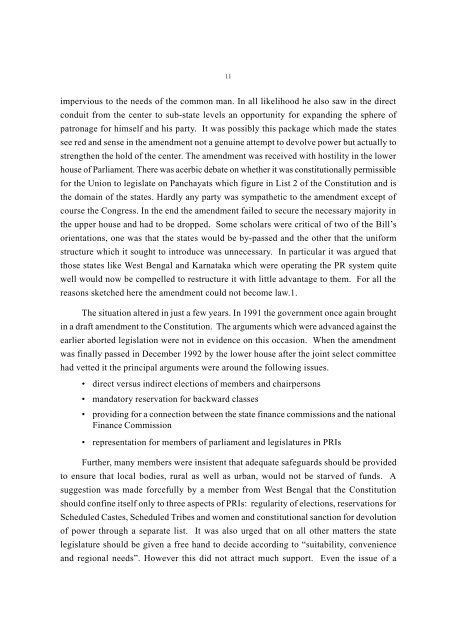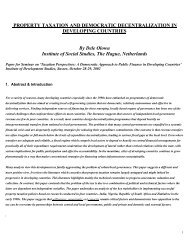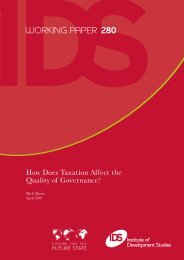View Article - Institute of Development Studies
View Article - Institute of Development Studies
View Article - Institute of Development Studies
You also want an ePaper? Increase the reach of your titles
YUMPU automatically turns print PDFs into web optimized ePapers that Google loves.
11impervious to the needs <strong>of</strong> the common man. In all likelihood he also saw in the directconduit from the center to sub-state levels an opportunity for expanding the sphere <strong>of</strong>patronage for himself and his party. It was possibly this package which made the statessee red and sense in the amendment not a genuine attempt to devolve power but actually tostrengthen the hold <strong>of</strong> the center. The amendment was received with hostility in the lowerhouse <strong>of</strong> Parliament. There was acerbic debate on whether it was constitutionally permissiblefor the Union to legislate on Panchayats which figure in List 2 <strong>of</strong> the Constitution and isthe domain <strong>of</strong> the states. Hardly any party was sympathetic to the amendment except <strong>of</strong>course the Congress. In the end the amendment failed to secure the necessary majority inthe upper house and had to be dropped. Some scholars were critical <strong>of</strong> two <strong>of</strong> the Bill’sorientations, one was that the states would be by-passed and the other that the uniformstructure which it sought to introduce was unnecessary. In particular it was argued thatthose states like West Bengal and Karnataka which were operating the PR system quitewell would now be compelled to restructure it with little advantage to them. For all thereasons sketched here the amendment could not become law.1.The situation altered in just a few years. In 1991 the government once again broughtin a draft amendment to the Constitution. The arguments which were advanced against theearlier aborted legislation were not in evidence on this occasion. When the amendmentwas finally passed in December 1992 by the lower house after the joint select committeehad vetted it the principal arguments were around the following issues.• direct versus indirect elections <strong>of</strong> members and chairpersons• mandatory reservation for backward classes• providing for a connection between the state finance commissions and the nationalFinance Commission• representation for members <strong>of</strong> parliament and legislatures in PRIsFurther, many members were insistent that adequate safeguards should be providedto ensure that local bodies, rural as well as urban, would not be starved <strong>of</strong> funds. Asuggestion was made forcefully by a member from West Bengal that the Constitutionshould confine itself only to three aspects <strong>of</strong> PRIs: regularity <strong>of</strong> elections, reservations forScheduled Castes, Scheduled Tribes and women and constitutional sanction for devolution<strong>of</strong> power through a separate list. It was also urged that on all other matters the statelegislature should be given a free hand to decide according to “suitability, convenienceand regional needs”. However this did not attract much support. Even the issue <strong>of</strong> a





